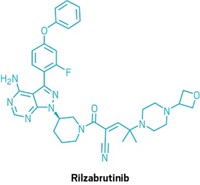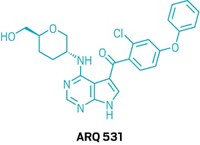Advertisement
Grab your lab coat. Let's get started
Welcome!
Welcome!
Create an account below to get 6 C&EN articles per month, receive newsletters and more - all free.
It seems this is your first time logging in online. Please enter the following information to continue.
As an ACS member you automatically get access to this site. All we need is few more details to create your reading experience.
Not you? Sign in with a different account.
Not you? Sign in with a different account.
ERROR 1
ERROR 1
ERROR 2
ERROR 2
ERROR 2
ERROR 2
ERROR 2
Password and Confirm password must match.
If you have an ACS member number, please enter it here so we can link this account to your membership. (optional)
ERROR 2
ACS values your privacy. By submitting your information, you are gaining access to C&EN and subscribing to our weekly newsletter. We use the information you provide to make your reading experience better, and we will never sell your data to third party members.
Pharmaceuticals
Targeted Drugs Get Traction
Drug firms announce advances in personalized medicine at oncologists' meeting
by Lisa M. Jarvis
June 8, 2009
| A version of this story appeared in
Volume 87, Issue 23

Although no major breakthroughs in cancer treatment were announced at the annual meeting of the American Society of Clinical Oncology (ASCO), held last week in Orlando, Fla., patients still got plenty of good news. On the basis of early results from a number of clinical trials using biomarkers and genetics to identify patients, drug companies finally appear to be harnessing the potential of personalized medicine.
"We believe it could be remembered as a landmark conference for molecularly targeted therapy," says Howard Liang, a stock analyst at Leerink Swann who covers the drug industry. He notes that drug companies are getting better at figuring out which cancer patients have the genetic makeup to benefit from their drugs and then designing clinical trials accordingly.
Lung cancer, in particular, is becoming an increasingly "genotypical disease," Liang says. At the meeting, AstraZeneca unveiled data suggesting its lung cancer pill Iressa is highly effective at shrinking tumors in a small portion of the population. The company launched Iressa under FDA's accelerated approval program in 2003, but the agency limited its use in 2005 after a larger trial showed the drug did not help patients live longer.
The new study shows that Iressa works for Asians who have been nonsmokers or light smokers and have a mutation in the epithelial growth-factor receptor gene.
Pfizer revealed at ASCO that it has identified a subset of patients who will benefit most from its lung cancer drug candidate figitumumab. The anti-insulin growth factor-type 1 (IGF-1) receptor antibody, now in Phase III studies, appears to work best when added to the chemotherapy regimen of patients with high levels of free IGF-1 in their plasma. Pfizer is exploring additional biomarkers to help determine which other patients will be most sensitive to figitumumab.
Meanwhile, Merck & Co. and AstraZeneca are teaming up to study how different protein targets interact in certain cancer pathways. At ASCO, the companies announced a unique collaboration to study the merits of giving two protein-targeting drug candidates, the MEK inhibitor AZD6244 and the AKT inhibitor MK2206, in combination for solid tumors.
Often, both the MEK and AKT pathways are turned on in these tumors, and the companies believe blocking both proteins would improve and prolong the efficacy of the drugs. Merck and AstraZeneca will jointly launch a Phase I trial to study the benefit of coadministering the compounds.




Join the conversation
Contact the reporter
Submit a Letter to the Editor for publication
Engage with us on Twitter